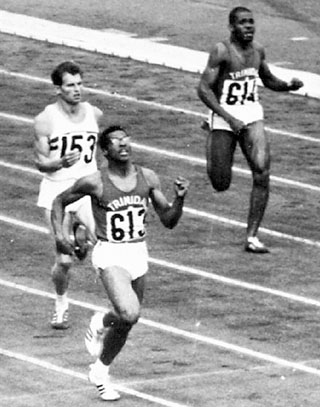media_artricles :: 2014
Tasting Tokyo silver
The Wendell Mottley chapter revisited
Kwame Laurence :: Trinidad Express :: 23.10.2014On October 19, 1964, Wendell Mottley captured Trinidad and Tobago’s first ever Olympic 400 metres medal. The bespectacled quartermiler produced a 45.2 seconds clocking to earn silver at the Tokyo Games, just behind American Mike Larrabee (45.1).
Mottley became the country’s second post-independence Olympic medallist, following in the strides of Edwin Roberts, who had earned 200m bronze two days earlier.
Mottley says a lot of his success on the track has to do with his secondary school experience.
“The institution of Queen’s Royal College, and it was quite an institution, had a profound effect on my life. Certainly John Grell, certainly Horace Springer, as Games Masters at QRC, spent enormous time with us, and had a profound effect. But then, at the same time, you had Jeffrey Stollmeyer coming back to coach cricket, and out of that came Deryck Murray. You had cyclists come back to coach, and out of that you had Roger Gibbon. And of course QRC produced great footballers, Lincoln Phillips and so forth, all at the same time.
“And then,” Mottley continues, “one Leroy Williams, an old QRC boy, came back to coach track and field. Out of that very, very rich medium came a lot of great sportsmen, great athletes. It was a time of QRC renaissance, because at the same time you had Peter Minshall coming up in the arts. That hothouse atmosphere of achievement was very, very important to all of us, and we all supported each other.”
One of Mottley’s contemporaries at QRC, Edwin Skinner, finished eighth in the 1964 Olympic 400m final in 46.8 seconds. And another T&T athlete, Belmont Intermediate old boy Kent Bernard exited at the semifinal stage of the same event.
Mottley, who finished second in his semifinal heat in 45.9 seconds, recalls the build-up to the championship race.
“The first thing is that you warm up outside, and you’re very much an individual. Then you go into the stadium, and the dark and the hush. The Japanese officials come by and they check your numbers, and for the first time real nerves because you’re aware of your fellow competitors right at your side. Then you go out of that environment, through the archway of the tunnel into the bright lights of the stadium and 60-plus thousand people. Nerves start to kick in.
“You have worked all your life for this, and this is the moment, and you start getting nervous. But then, once you start knocking your blocks in and you put the nails in, you shut everything else out, and you focus. All the training that you’ve done, all the repeat 200s that you’ve done over several years comes to focus, and you just become a highly concentrated machine.”
The Mottley machine remembers the 1964 Olympic men’s 400m final as though it happened yesterday.
“I get off to an excellent start, and very quickly haul into the lead. The guy who I’m watching, Ulis Williams is caught. I come onto the back stretch and feel very confident. And then on to the home stretch, I see the tape, probably 70 yards away, and I start to feel hmmm, I could bite gold, I could even taste it. I see through the edge of my eye, I see this shadow, it’s not even a figure, and at the actual tape I lose this race by what we in Trinidad would call ah umph, ah umph.
“There’s disappointment at first,” Mottley recalls. “But then the overwhelming feeling thereafter. Relief. Regrets that you didn’t get that gold, which I’d set my heart on. I could actually taste it. The mind is saying there’s gold there for you. But then comes relief that it’s finished and done with, and that you must then garner up enough energy and so forth to deal with the relay coming thereafter.”
T&T’s quadruple OIympic medallist, Ato Boldon is now one of the world’s leading track and field analysts.
“Everybody, if you ask them, almost acts as though our Olympic history started with Hasely (Crawford). Our Olympic track and field history began with Wendell Mottley,” Boldon declares. “He was so good for so long. He had the credentials at the NCAA level, at the Olympic level, relays and individual...came very, very close to being an Olympic gold medallist.
“To me, you don’t get to Hasely until you look back at how close Wendell came. Sometimes, you have to have somebody almost get there for somebody else looking on in Trinidad and Tobago to say: ‘You know what, look how close he came. I can do it.’ As a result, I hold Wendell in very, very high esteem in terms of T&T Olympic history.”
Though he is now 73, Mottley still has an active professional life. The former Government Minister is Chairman of the Unit Trust Corporation. But while he has made significant contributions to the political and economic landscape, it is Mottley’s silver run at the Tokyo Olympics 50 years ago that has earned him his very own chapter in the T&T history books.
EDITOR’S NOTE: Next Friday, we celebrate Trinidad and Tobago’s 4x400 metres bronze at the Tokyo Games

Enlarge Image
EN ROUTE TO SILVER: Wendell Mottley, left (with glasses), en route to silver in the men's 400 metres final, at the 1964 Olympic Games, in Tokyo, Japan. Mottley's Trinidad and Tobago teammate, Edwin Skinner, right, finished eighth.

Close Window